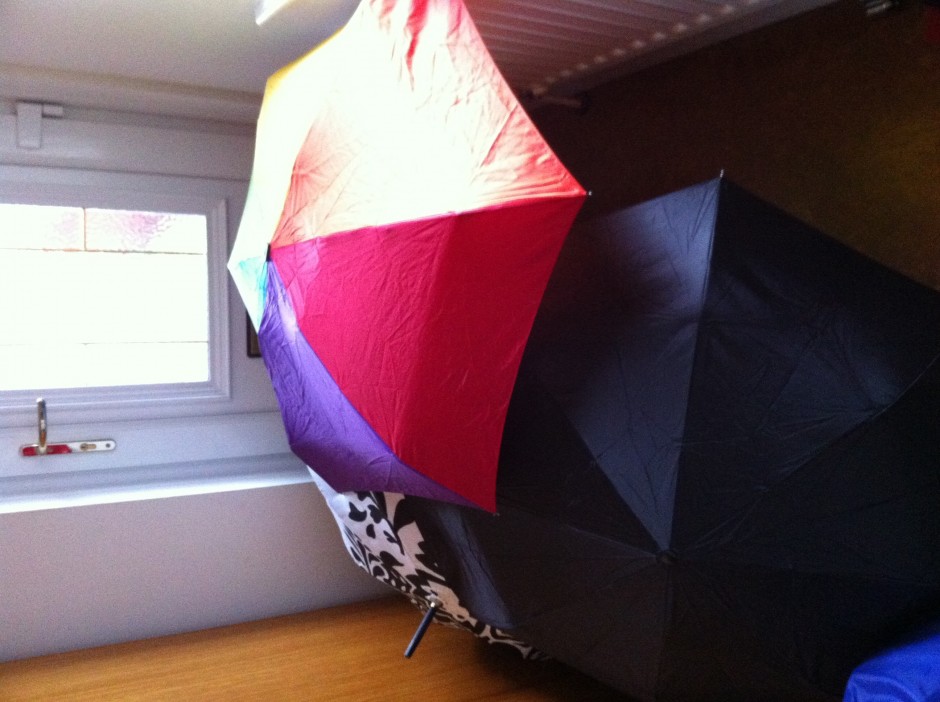Is it Friday again already? Well, no, but I am away all day tomorrow at an Open University event, so this week’s post comes to you a day early. Lucky you!
What with the Bank Holiday and not being around tomorrow, it has been a short week, but still an interesting one. We spent the weekend at my parents’ house in Wonderful West Sussex (its official name, obviously), where I saw my first ever dragonfly nymph. I recognised it from a drawing in one of my daughter’s books, thus adding to the list of useful things I have learned from reading to her. Did you know mallards can’t fly for a portion of spring while their feathers moult? You do now. (That came from the marvellous Make Way for Ducklings). I, my wife and my daughter also became closely acquainted with a newt for the first time, after my Dad accidentally fished one out of the pond when clearing weeds. Funny little things – they look like they can’t decide whether to be lizards or fish.
The week has been rather soggy, as you may have noticed. When my daughter spotted my umbrella drying in the foyer, we ended up playing Pooh-and-Piglet in the ‘umbrella house’ for quite some time. A definite silver lining to that cloud.
Teaching-wise, this was the week that the final assignments were due for my Open University students. My tutor group has been hit by a number of family and personal problems this year, so I’ve had to help a couple of students at the last minute – hopefully cleared up now. But tomorrow is one of my favourite days of the OU year: meeting up with my A215 colleagues to do our marking co-ordination, where we all argue over the merits of a sample of assignments, trying to attune our marking instincts to parallel levels! The sole downside of working for the OU is not getting to see my colleagues very often, so spending a whole day with them is something to look forward to.
I am told that bookings are going well for my Jane Austen House workshop, so if you want to come, don’t leave it too much longer!
The deadline for the Bridport Prize is tomorrow, so I’ve sent in my effort – the poem I used in March and April to establish a daily drafting habit. I don’t expect it will get anywhere, but I think it’s important to get into a habit of entering the major competitions.
And lastly, writing. That poem that was stonewalling me last week has continued to do so. On Tuesday I literally just stared at it, and at my notes. I could barely figure out what they meant, let alone advance the piece. Just one of those days. Yesterday I figured I needed a bit of a boost, so I started by re-reading some Twyla Tharp’s The Creative Habit. As regular readers will know, she is my creative guru of choice at present, and she didn’t let me down. I thought through her ideas about ‘scratching’ (finding first ideas) and ‘spine’ (the principle or structure that sets out your aims and method for a piece, and guides you through the process of making it), and got somewhere. First of all, I clarified the core ‘idea’ that lies behind the poem: to write about a baby experiencing the world for the first time. It may not sound much, put like that, but the very simplicity was freeing; I had clogged myself up with trying to combine about 5 different ideas into the poem, and that made the whole task seem clear again.
Today, I think I might have got a hold of how ‘spine’ might work in poetry. Tharp is very hot on the importance of this. Here’s how she describes the experience of trying to create without it:
Before I made the spine a habitual part of my creative process, I used to agonise through rehearsal periods. If rehearsals weren’t going well, I would be dimly aware of it, but I wouldn’t know why specifically. I would have a vague feeling of dissatisfaction during the rehearsal (“This isn’t working.”) and a more clearly etched feeling of emptiness and despair afterward (“I stink. I’ll never do anything good again.”) It was a horrible feeling, like walking through thick fog. (page 145).
I absolutely understand and share those experiences. But I’d had some trouble working out what spine can be poetry; it can be partly a narrative structure, but there had to be more to it than that.
Then this morning, as I re-read my first version of the poem, I suddenly wondered whether the canzone form, as used by George Szirtes, might help me write it. I’ve just started reading Szirtes’ new collection Bad Machine, and I was very taken by his use of the canzone to go around and around a theme, getting depth without losing forward drive. It seems to me that the Szirtes canzone is much more expansive than the rather astringent quatrains I’ve been using. It has long lines, long stanzas, and several of them; plenty of space to explore and involve the many, many different ideas and themes that I’ve generated in my notes and drafts so far. Whereas with the quatrains it feels as though I have to select a core theme and cut out the rest – which has been the sticking point, because I can’t do it – with the Szirtes canzone, I feel there should be enough space to include all of it. I feel much happier with that approach: the experience I’m writing about has several facets and I can’t see how to take any of them out. The Szirtes canzone will also help me to structure the argument; each stanza can explore a new stage of the experience and the ideas, but the procession of them should make sure that I keep moving at a reasonable pace. And Szirtes’ use of repeated end-words may be appropriate for the layered, recurring nature of many of the themes and objects that I want to use.
Suddenly I feel that I have been given a spine – a structure that I feel can carry me through the material I want to write. The form itself is not the whole spine – that also comprises a narrative aim – but it is a big part of it. I might actually call it an exo-skeleton: the right external structure that can hold, shape, protect, form.
I got to that realisation at about the point where I had to stop drafting, so I’ve not yet been able to test out this belief. Besides, I want to study how Szirtes uses it some more first. But I feel hopeful, and will do my best to give it a go next week – despite having dozens of final assignments to mark!

